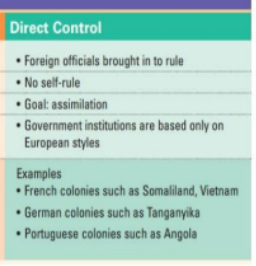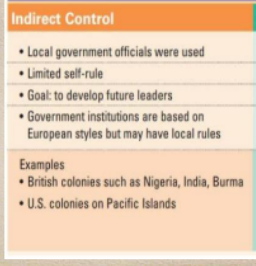Chapter 15 - Age Of Imperialism
5.0(2)
Card Sorting
1/35
Earn XP
Description and Tags
Last updated 12:44 PM on 2/13/23
Name | Mastery | Learn | Test | Matching | Spaced | Call with Kai |
|---|
No analytics yet
Send a link to your students to track their progress
36 Terms
1
New cards
Imperialism
domination by one country of the political, economic, or cultural life of another country or region
2
New cards
Annexation
addding a territory to an existing state or country
3
New cards
“Jewel of the Crown”
* In 1858, India formally became a direct possession of the British Crown
* played a key role (economic, strategic, military) in the expansion and consolidation of the British Empire.
* played a key role (economic, strategic, military) in the expansion and consolidation of the British Empire.
4
New cards
Boer
Dutch farmers who settled in Cape Town, Africa, and eventually migrated inland
5
New cards
Boer War
* 1899–1902
* a war in which Great Britain defeated the Boers of South Africa
* a war in which Great Britain defeated the Boers of South Africa
6
New cards
Shaka
was a Zulu chief and founder of southern Africa’s Zulu empire.
7
New cards
Social Darwinism
* natural selection applied to human society
* survival of the fittest
* survival of the fittest
8
New cards
Sepoy
Indian soldier who served in an army set up by the French or English trading companies
9
New cards
Raj
A system of British colonial rule in India
10
New cards
Berlin Conference
was a meeting between European powers to colonize Africa
11
New cards
Paternalism
the system of governing a country as a father would a child
12
New cards
Assimilation
absorb or adopt another culture
13
New cards
Geopolitics
the struggle over the control of geographical entities with an international and global dimension, and the use of such geographical entities for political advantage.
14
New cards
Quinine
A medicine that helped Europeans survive deadly tropical diseases such as malaria.
15
New cards
Great Game
* was a competition between Russia and Britain for influence in Persia
* Russia wanted to protect its southern frontier and expand into central asia
* Britain wanted to protects its interests in India
* both powers sought to increase their influence in the Ottoman empire, Persia, Afghanistan, and Tibet.
* Russia wanted to protect its southern frontier and expand into central asia
* Britain wanted to protects its interests in India
* both powers sought to increase their influence in the Ottoman empire, Persia, Afghanistan, and Tibet.
16
New cards
Suez Canal
a canal in Egypt linking the Red Sea and the Indian Ocean to the Mediterranean Sea, which also links Europe to ports in Asia and East Africa
17
New cards
King Mongkut & Siam
* was king of Siam (modern-day Thailand) from 1851–1868.
* Mongkut lived as a Buddhist monk before becoming king.
* he was fond of Western philosophies and worked to modernize his kingdom.
* His educated children were able to further his progress after his death.
* Mongkut lived as a Buddhist monk before becoming king.
* he was fond of Western philosophies and worked to modernize his kingdom.
* His educated children were able to further his progress after his death.
18
New cards
Sepoys
Indian soldiers
19
New cards
Sepoy Uprising
* Also called the uprising of 1857 or Sepoy rebellion
* several sepoy regiments and Indian rulers marched to Delhi to hail the last Mughal ruler as their leader
* in some places, British men, women and children were brutally massacred by the sepoys
* The British soon crushed the revolt and took revenge by slaughtering thousands of unarmed Indians
* several sepoy regiments and Indian rulers marched to Delhi to hail the last Mughal ruler as their leader
* in some places, British men, women and children were brutally massacred by the sepoys
* The British soon crushed the revolt and took revenge by slaughtering thousands of unarmed Indians
20
New cards
Menelik II & Ethiopia
* modernized Ethiopia
* hired European experts to plan modern roads and bridges
* set up a western school system
* imported the latest weapons and European officers to help train his army
* all of this helped Ethiopia keep its independence when the Italians tried to invade in 1896
* hired European experts to plan modern roads and bridges
* set up a western school system
* imported the latest weapons and European officers to help train his army
* all of this helped Ethiopia keep its independence when the Italians tried to invade in 1896
21
New cards
Maji Maji War
* the germans triumphed only after burning acres and acres of farmland
* left thousands of local people to die of starvation
* left thousands of local people to die of starvation
22
New cards
Crimean War
war fought mainly on the Crimean Peninsula between the Russians and the British, French, and Turks from 1853–1856
23
New cards
Sati
It called for a widow to join her husband in death by throwing herself on his funeral prye
24
New cards
Muhammad Ali
* 1769–1849
* was often called the “founder of modern Egypt”
* was the son of a military commander who died when he was a young boy
* He was appointed governor of Egypt by the Ottomans and seized power during the chaos of the civil war following Napoleon’s invasion
* set in motion a number of economic, political, administrative, and military reforms
* His reforms were intended to secure Egyptian independence and place Egypt on the road to becoming a major Middle Eastern power
* was often called the “founder of modern Egypt”
* was the son of a military commander who died when he was a young boy
* He was appointed governor of Egypt by the Ottomans and seized power during the chaos of the civil war following Napoleon’s invasion
* set in motion a number of economic, political, administrative, and military reforms
* His reforms were intended to secure Egyptian independence and place Egypt on the road to becoming a major Middle Eastern power
25
New cards
Ram Mohun Roy
* 1772–1833
* was a founder of Hindu College in Calcutta
* it provided an English-style education to Indians
* wanted to reform some parts of traditional Indian and Hindu culture but he also revived India’s pride in its culture
* He is considered the founder of Indian nationalism.
* was a founder of Hindu College in Calcutta
* it provided an English-style education to Indians
* wanted to reform some parts of traditional Indian and Hindu culture but he also revived India’s pride in its culture
* He is considered the founder of Indian nationalism.
26
New cards
Direct Control
Reflected the European belief that colonial people were incapable of ruling themselves

27
New cards
Indirect Control
* did not replace traditional rulers with European officials
* local rulers had limited power and did not influence government decisions
* local rulers had limited power and did not influence government decisions

28
New cards
Forms of imperialism
* Protectorate
* Sphere of influence
* Colony
* Economic imperialism
* Sphere of influence
* Colony
* Economic imperialism
29
New cards
Protectorate
A country or territory with its own internal government but under the control of an outside power
* ex: Britain established a protectorate over the Niger River Delta
* ex: Britain established a protectorate over the Niger River Delta
30
New cards
Sphere of Influence
An area in which an outside power claims exclusive investment or trading privileges
* ex: Liberia was under the sphere of influence of the U.S.
* ex: Liberia was under the sphere of influence of the U.S.
31
New cards
Colony
A country or territory governed internally by a foreign power
* ex: Somaliland in East Africa was a french colony
* ex: Somaliland in East Africa was a french colony
32
New cards
Economic Imperialism
An independent but less developed country controlled by private business interests rather than other governments
* ex: the dole fruit company controlled pineapple trade in Hawaii
* ex: the dole fruit company controlled pineapple trade in Hawaii
33
New cards
What caused imperialism?
* Nationalism
* to gain power and display national pride
* Europeans competed for colonies and trade
* Economic Competition
* Demand for raw materials and new markets
* Missionary Spirit
* Spread Christianity teaching to the world
* to gain power and display national pride
* Europeans competed for colonies and trade
* Economic Competition
* Demand for raw materials and new markets
* Missionary Spirit
* Spread Christianity teaching to the world
34
New cards
How is social darwinism connected to imperialism?
Europeans argued they were superior to all others and imperial conquest of weaker races was simply nature’s way of improving human species.
35
New cards
What is the relationship between the industrial revolution and imperialism?
During the Industrial Revolution, the western world advanced in sciences, technology, transportation, industry, and communication. These advances gave the western world the tools they needed to expand their overseas empires.
36
New cards
How were the Europeans able to infiltrate and control the interior of Africa?
* they explored the rivers of Africa
* adventurers mapped out the course and sources of the great African rivers such as the Niger, the Nile, and the Congo
* Missionaries sought to spread Christianity
* took a paternalistic view of Africans
* David Livingstone
* was a British doctor and missionary and explorer who influenced Western attitudes toward Africa.
* The Berlin Conference
* adventurers mapped out the course and sources of the great African rivers such as the Niger, the Nile, and the Congo
* Missionaries sought to spread Christianity
* took a paternalistic view of Africans
* David Livingstone
* was a British doctor and missionary and explorer who influenced Western attitudes toward Africa.
* The Berlin Conference